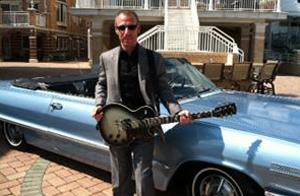The Complete Guitarist: Teaching 101 — How to Maximize Every Student's Potential

Teachers. Every single one of us, musician or not, has had them. Some of inspired us, some have bored us, some have twisted us, but all of them have one thing in common: They've all changed us in some way, for better or for worse.
Whether you are a beginner or an advanced player, you need to seek out instruction. There is no way to get to the next level without it. As teachers, we have an immense responsibility to a student's growth as a player and as a person. It's a responsibility I take very seriously, and I hope you do too. We are entrusted with the authority to shape a student's musical future.
This is not to be taken lightly. The rewards are incredible. To watch students walk into a first lesson not having any clue about how to even hold a guitar and to watch them progress into fine players and fine young men and women is a joy to behold. I've seen firsthand how learning an instrument can change a students' lives by helping with their self-esteem, helping them overcome shyness and using the discipline it takes to get better at an instrument to take other areas of their academic life to the next level.
But just how do we, as educators, maximize every student's potential? Here are some steps:
Accept Uniqueness: Not very student is the same. Each lesson and approach has to be tailored to meet the student's individual needs and personality. Some of my students are far more sensitive than others, so corrections and criticism have to be handled with kid gloves. Other students aren't so sensitive. I used to find this out the hard way. Now I try and gauge them through conversation, aside from the lesson. I follow my instinct and I am usually correct. Encourage the student to have his or her own unique personality, and let it shine through in whatever they are playing and learning.
Be Educated: Know as much as you possibly can about music and your instrument or instruments. I cannot stress this enough. The more knowledge you have, the better teacher you will be. That's the bottom line. Get degrees from universities. They are credibility and proof that you put in the time to be better at your craft, the same thing you are asking your students to do. Learn how to read music. Again, this is a no-brainer for me. It amazes me how many guitar teachers I have met who teach students without having the basic reading skills necessary for a musician. Are they effective teachers? More than likely they are. Are they limiting the student's potential? Yes, because they themselves are limited. Show me a brilliant guitar player who cannot read music and I will show you 20 who can.
Be Flexible: If a student has the necessary skills to deviate from your lesson plan and try to play something they really want to play, by all means let them do so. On more than one occasion, some of my piano students wanted to play something other than the Bach minuets or the John Schaum lessons I was showing them. They wanted to play something more contemporary such as The Beatles or a movie theme. I always negotiate a compromise: Learn this and we can learn whatever you want, given the appropriate ability level, of course. This approach always works. It gives the students that extra incentive to get through the important lesson I have for them to move on to that Adele song they've been dying to play.
All the latest guitar news, interviews, lessons, reviews, deals and more, direct to your inbox!
Always honor your promise. You never want to say, "That's not on page 35 of the red book, so we can't do it." One of my guitar students wanted to learn "Holy Wars (The Punishment Due)" from Megadeth about four lessons into our time together! It was way beyond what I thought he was capable of, so I threw a challenge and compromise out to him: Memorize what I have taught you over the past four weeks and play it perfectly, and we will go for it. He did it and we attempted the song. It was a struggle for him, but he pretty much worked his behind off and for the most part got it. I then used that experience as a springboard of sorts to do other challenging songs. Flexibility will keep you and your students more interested in the lessons.
Be Authentic: If my students know one thing about me, it is this: There is nothing I wouldn't ask them to do that I haven't done already. If I ask them to memorize the changes to "Stairway To Heaven," I have done it until I was blue in the face. If I ask a student to play three octave scales in all keys, I have done it a million times. Students can see right through you. If you haven't done your homework, they will know. If a student asks you a question and you're not sure of the answer, be honest, look it up and have it ready for the next lesson.
One more thing: Teaching will help your own playing. Teaching a student a lead part or a chord progression will invariably help your ear. Breaking a guitar lead down to its basic phrases will definitely help you see how to construct an effective lead break. and that can only further your own playing. When a student asks me how to play a certain phrase, it forces me to think about the notes I played and why I played them. Deconstructing your own playing will reinforce what you already know.
As Joseph Joubert said, "To teach is to learn twice." Remember, you are here to give your students a more effective and beautiful musical experience. The more tools you have at your disposal, the more likely you will do so.
Now get out there and teach your children well!
Thanks for reading. Feedback, questions or comments are encouraged!
Guitarist Richard Rossicone is a veteran of the New York City and Long Island original and cover band scene. He's been playing since he was 8, when he attended his first concert (Kiss) and saw Pete Townshend smash a guitar. He has studied with various instructors over the years, which led him to a career in music therapy. He began his educational journey at Queensboro Community College, where the faculty introducing him to classical music. He received his associate's degree in fine arts in 1997 and went on to receive his bachelor's in music therapy in 2001 and his master's in music therapy from New York University in 2004. He's been Board Certified as a music therapist since 2002. Richard continued his studies at C.W. Post University, pursuing a second master's degree in classical guitar performance and music history, studying under Harris Becker. He's been teaching guitar, piano and theory since 2002 and in 2006 started his own company, Rossicone Music Studios. Richard is the co-lead guitarist in Bad Habits, NYC's premier Thin Lizzy tribute band. Visit him at Axgrinder.com
